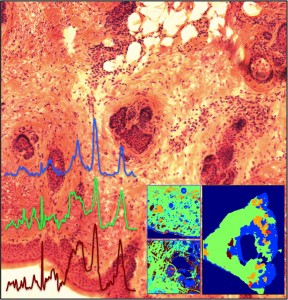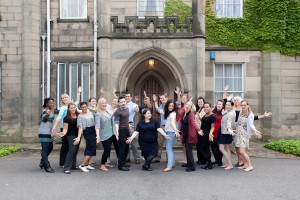
September 19, 2013, by Zoë Goodwin
News from the week in brief
Very brief
This week at the University our researchers have seen great success. Experts have been able to speed up and improve the diagnosis of cancer tissue during surgery as well as reduce unnecessary surgery and another Nottingham research project has found that altruistic or selfless behaviour is an attractive trait in a potential sexual partner. Also this week, an unusually ‘theatrical’ piece of university research on the care of people with dementia has been shortlisted for a prestigious award. And last of all, high performing student nurses pilot the first leadership academy.
So that was this week’s news put very briefly, so read on for a little more information and click on the links for the full story.
Brief
 Tissue-conserving cancer surgery is a highly skilled procedure which involves time-consuming tissue preparation to detect the margins of cancerous tissue. The goal is to remove as much of the tumour as possible while sparing healthy tissue. Nottingham experts have developed a highly accurate prototype technique which can produce a detailed ‘spectroscopic fingerprint’ of each tissue layer removed during surgery. Dr Ioan Notingher who led this research project said: “By refining our prototype instrument to make it more user-friendly and even faster to use. Diagnosis of each tissue layer could be obtained in just a few minutes — rather than hours. Such developments have the potential to revolutionise the surgical treatment of cancers. This technology will provide a fast and objective way for surgeons to make sure that all the cancer cells have been removed whilst at the same time preserving as much healthy tissue as possible.”
Tissue-conserving cancer surgery is a highly skilled procedure which involves time-consuming tissue preparation to detect the margins of cancerous tissue. The goal is to remove as much of the tumour as possible while sparing healthy tissue. Nottingham experts have developed a highly accurate prototype technique which can produce a detailed ‘spectroscopic fingerprint’ of each tissue layer removed during surgery. Dr Ioan Notingher who led this research project said: “By refining our prototype instrument to make it more user-friendly and even faster to use. Diagnosis of each tissue layer could be obtained in just a few minutes — rather than hours. Such developments have the potential to revolutionise the surgical treatment of cancers. This technology will provide a fast and objective way for surgeons to make sure that all the cancer cells have been removed whilst at the same time preserving as much healthy tissue as possible.”
To learn more about this procedure, click here.
New research led by researchers from Nottingham University and Liverpool John Moores University found that selflessness can be attractive to a potential  sexual partner. They conducted an experiment with 32 women and 35 men, and asked them to rate the attractiveness of the opposite sex based on a list of qualities, including attributes that were selfless such as ‘he does the shopping for his elderly neighbour’ and those that were considered neutral such as preferences for food. Dr David Moore, Senior Lecturer in Psychology from Liverpool John Moores University said: “This study adds to a growing body of research which tries to explain why nice guys (and girls) might not always finish last!”
sexual partner. They conducted an experiment with 32 women and 35 men, and asked them to rate the attractiveness of the opposite sex based on a list of qualities, including attributes that were selfless such as ‘he does the shopping for his elderly neighbour’ and those that were considered neutral such as preferences for food. Dr David Moore, Senior Lecturer in Psychology from Liverpool John Moores University said: “This study adds to a growing body of research which tries to explain why nice guys (and girls) might not always finish last!”
To read the researchers’ explanation for this finding, click here.
 ‘Inside Out of Mind’ by Tanya Myers is a play which explores the experiences of health care assistants working in a dementia ward. It was commissioned by social care researchers as a way of bringing to life field notes from a ‘fly-on-the-wall’ investigation into the caring environment on the wards. The project has been shortlisted in the highly-competitive ‘Research’ category of the annual Times Higher Education Awards, generally seen as the ‘Oscars’ of the higher education sector in the UK. ‘Inside Out of Mind’ has already been well-received by audiences of healthcare professionals and the public. Sharon Howe, Modern Matron in Mental Health Services for Older People, said: ”It was simply moving, an excellent piece of work. It refreshed my reasons as to why I choose to work in the area of dementia. It is vital that those staff on the shop floor see this production.”
‘Inside Out of Mind’ by Tanya Myers is a play which explores the experiences of health care assistants working in a dementia ward. It was commissioned by social care researchers as a way of bringing to life field notes from a ‘fly-on-the-wall’ investigation into the caring environment on the wards. The project has been shortlisted in the highly-competitive ‘Research’ category of the annual Times Higher Education Awards, generally seen as the ‘Oscars’ of the higher education sector in the UK. ‘Inside Out of Mind’ has already been well-received by audiences of healthcare professionals and the public. Sharon Howe, Modern Matron in Mental Health Services for Older People, said: ”It was simply moving, an excellent piece of work. It refreshed my reasons as to why I choose to work in the area of dementia. It is vital that those staff on the shop floor see this production.”
To hear more about this innovative play, click here.
The National Junior Leadership Academy (NJLA) established by Nottingham University has seen the first cohort of high achieving student nurses through their first residential retreat.  This academy aims to support high performing nursing students to construct a leadership identify early in their career journey, equipping them to target the challenges they are likely to face due to the healthcare reforms. The NJLA involves a three day residential leadership retreat and a two week internship followed by another two day residential retreat. The programme also offers mentor support, coaching and the formation of peer to peer regional leadership networks with tasks and activities to be completed between retreats.
This academy aims to support high performing nursing students to construct a leadership identify early in their career journey, equipping them to target the challenges they are likely to face due to the healthcare reforms. The NJLA involves a three day residential leadership retreat and a two week internship followed by another two day residential retreat. The programme also offers mentor support, coaching and the formation of peer to peer regional leadership networks with tasks and activities to be completed between retreats.
To hear about the experience from a Nottingham student nurse, click here.
No comments yet, fill out a comment to be the first

Leave a Reply